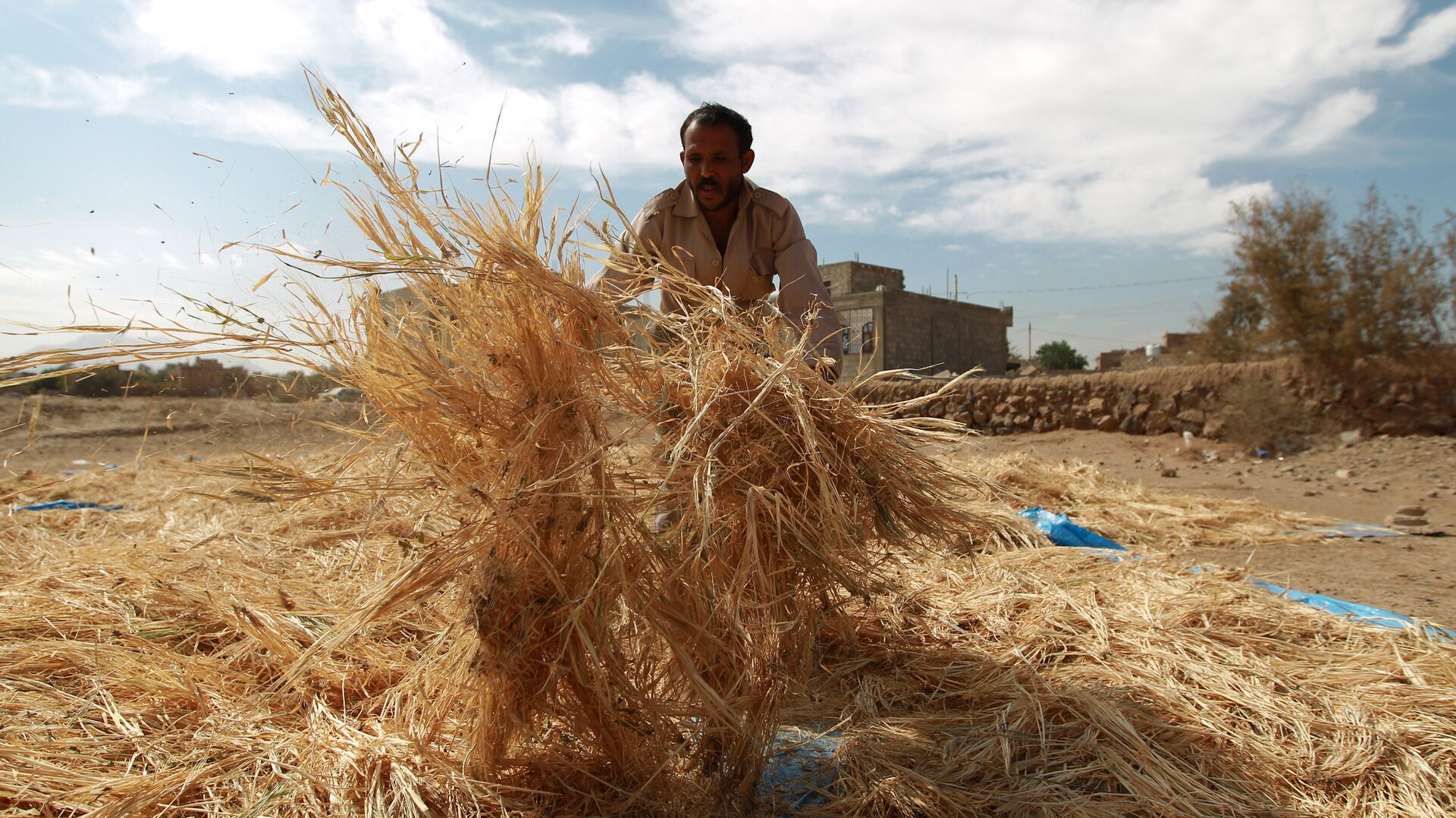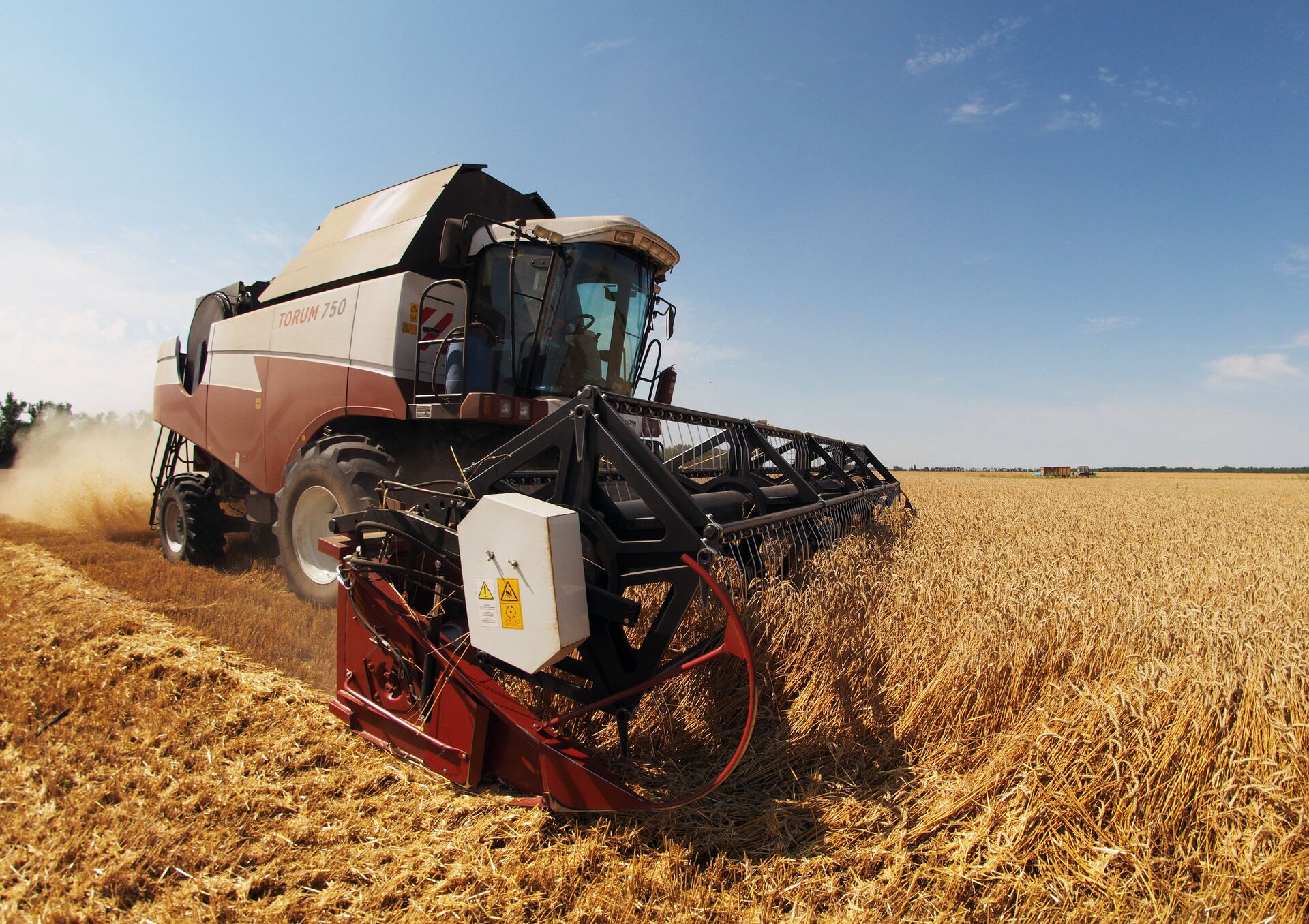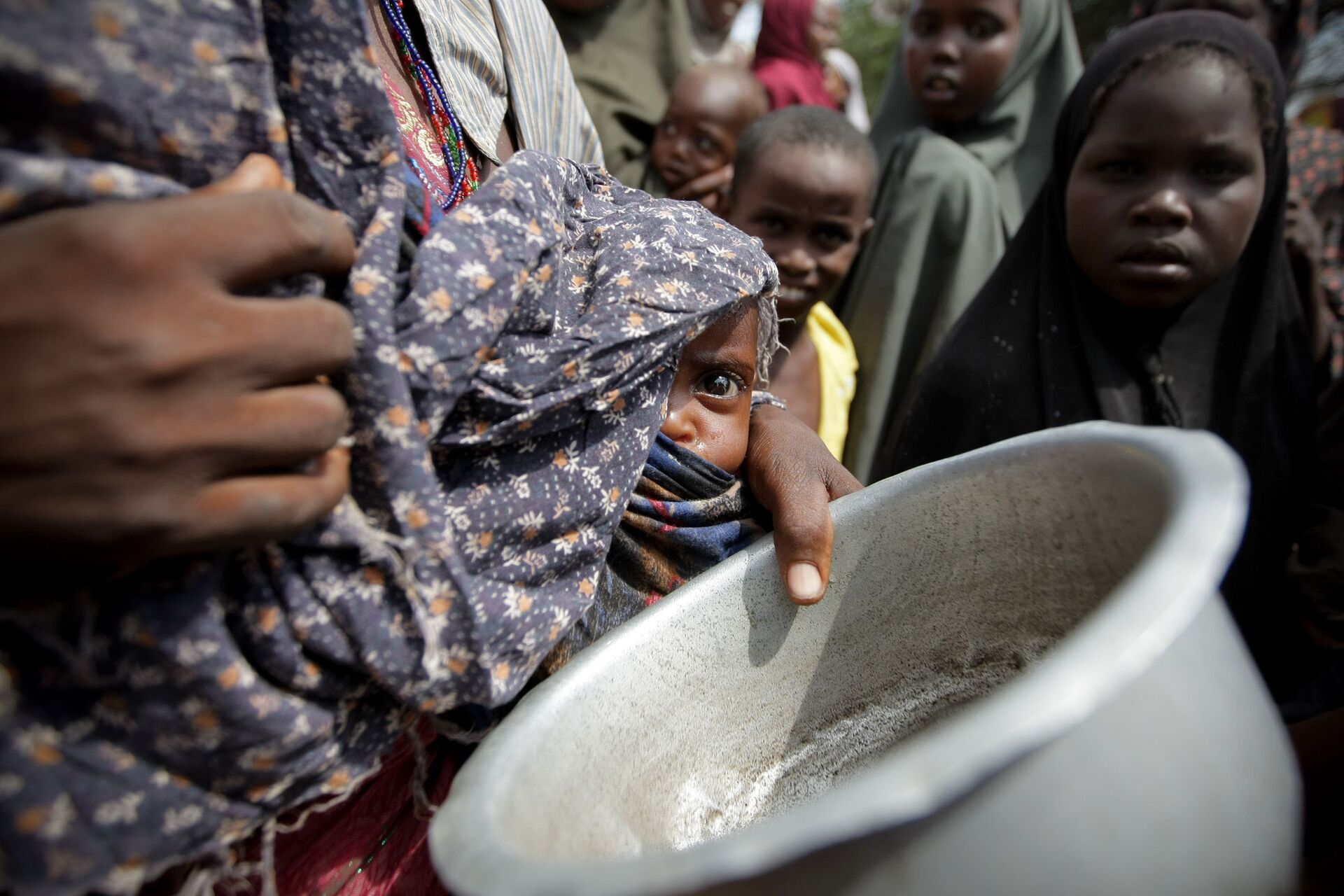https://sputnikglobe.com/20220430/experts-warn-about-social-unrest-amid-rising-food-prices-due-to-conflict-in-ukraine-1095162848.html
Experts Warn About Social Unrest Amid Rising Food Prices Due to Conflict in Ukraine
Experts Warn About Social Unrest Amid Rising Food Prices Due to Conflict in Ukraine
Sputnik International
MOSCOW (Sputnik), Kirill Krasilnikov - The rising food prices spurred by the ongoing Russian military operation in Ukraine and Western sanctions against Moscow... 30.04.2022, Sputnik International
2022-04-30T07:44+0000
2022-04-30T07:44+0000
2022-04-30T07:44+0000
food
russia
gas
https://cdn1.img.sputnikglobe.com/img/104666/30/1046663098_0:107:2898:1737_1920x0_80_0_0_9eb8a8adc29743fb0b7cd3bac24eb60f.jpg
According to the UN Food and Agriculture Organisation (FAO), Russia and Ukraine were among the top global exporters of various types of staple foods, including wheat and corn, in 2021, while Russia was also the leading exporter of nitrogen fertilisers, the second major supplier of potassium fertilisers and the third largest supplier of phosphorous fertilisers.The organisation has noted that Ukraine's food production is threatened by factors like disruption of logistics, loss of access to agricultural lands, labor shortages, damage to crops due to hostilities, and destruction of food system assets and infrastructure.Meanwhile, the Western sanctions on Russia have undermined the latter's sales of agricultural products abroad and prompted Moscow to retaliate by freezing fertiliser exports.As a result, the global food prices hit the highest ever levels in March, while the International Monetary Fund (IMF) warned earlier in April that global food prices will likely rise further in the future due to the conflict in Ukraine, sanctions against Russia and Belarus, as well as climate issues.This spells considerable trouble for many countries in Africa, Middle East and East Asia that rely on food imports from Russia and Ukraine, as some of them are already finding themselves in a precarious social and political situation that could be further aggravate by potential food shortages.Looming CrisisSylvain Charlebois, a professor in food distribution and policy at Dalhousie University in Halifax, Canada, told Sputnik that roughly 15% of all calories in the world come from wheat, with corn covering a lot of calorific ground as well. Considering that Russia and Ukraine are responsible for 25% of grain exports, wheat deficit is going to be a major challenge this year, per the expert.A source in the US academic community told Sputnik that the global food security was affected by the ongoing "economic war against Russia," which aims to undermine the country's energy production, resulting in skyrocketing oil and natural gas prices.Sunghun Lim, an assistant professor at the in the Department of Agricultural and Applied Economics at Texas Tech University, noted the empirically proven connection of rising food process with social and political conflicts throughout history and cited riots or civil wars that took place across Africa, Asia, Latin America, and the Middle East during the food crisis of 2008.Food HoardingA number of international organisations — the IMF, the World Bank, the UN World Food Program and the World Trade Organisation — have warned about the need to make urgent steps to ensure food security in the face of the conflict in Ukraine. Nevertheless, experts predict that countries will opt for looking out for themselves, further exacerbating the situation.The US academic source said that a lot of food producers seem to be limiting exports, adding that hoarding by the wealthiest parts of the world was an important factor.When asked whether other food-producing countries will step in and fill the empty niche or, on the contrary, limit their exports in order to replete their own food reserves, Lim noted that there is limited empirical evidence on the issue. At the same time, he highlighted the rapid effect of the disruption of global agricultural and food supply chains during the COVID-19 pandemic on rich and developing countries alike.
Sputnik International
feedback@sputniknews.com
+74956456601
MIA „Rossiya Segodnya“
2022
Sputnik International
feedback@sputniknews.com
+74956456601
MIA „Rossiya Segodnya“
News
en_EN
Sputnik International
feedback@sputniknews.com
+74956456601
MIA „Rossiya Segodnya“
Sputnik International
feedback@sputniknews.com
+74956456601
MIA „Rossiya Segodnya“
food, gas
Experts Warn About Social Unrest Amid Rising Food Prices Due to Conflict in Ukraine
MOSCOW (Sputnik), Kirill Krasilnikov - The rising food prices spurred by the ongoing Russian military operation in Ukraine and Western sanctions against Moscow could trigger social unrest in various countries around the world, experts told Sputnik.
According to the UN Food and Agriculture Organisation (FAO), Russia and Ukraine were among the top global exporters of various types of staple foods, including wheat and corn, in 2021, while Russia was also the leading exporter of nitrogen fertilisers, the second major supplier of potassium fertilisers and the third largest supplier of phosphorous fertilisers.
The organisation has noted that Ukraine's food production is threatened by factors like disruption of logistics, loss of access to agricultural lands, labor shortages, damage to crops due to hostilities, and destruction of food system assets and infrastructure.
Meanwhile, the Western sanctions on Russia have undermined the latter's sales of agricultural products abroad and prompted Moscow to retaliate by freezing fertiliser exports.
As a result, the global food prices hit the highest ever levels in March, while the International Monetary Fund (IMF) warned earlier in April that global food prices will likely rise further in the future due to the conflict in Ukraine, sanctions against Russia and Belarus, as well as climate issues.
This spells
considerable trouble for many countries in Africa, Middle East and East Asia that rely on food imports from Russia and Ukraine, as some of them are already finding themselves in a precarious social and political situation that could be further aggravate by potential food shortages.
Sylvain Charlebois, a professor in food distribution and policy at Dalhousie University in Halifax, Canada, told Sputnik that roughly 15% of all calories in the world come from wheat, with corn covering a lot of calorific ground as well. Considering that Russia and Ukraine are responsible for 25% of grain exports, wheat deficit is going to be a major challenge this year, per the expert.
"By the time we are done with 2022, it is likely that more than 100 million additional people on earth will experience either famine or acute hunger, something that the world has never seen before. Civil unrest in many countries in the Middle Eats and Africa is expected," Charlebois said.
A source in the US academic community told Sputnik that the global food security was affected by the ongoing "economic war against Russia," which aims to undermine the country's energy production, resulting in skyrocketing oil and
natural gas prices."A big disaster is coming. How much is due to the war, and how much to the total financial and economic war against Russia, is a big question. As I see it, the economic war against Russia makes the food situation all the more perilous, especially because food prices follow energy prices closely," they said.
Sunghun Lim, an assistant professor at the in the Department of Agricultural and Applied Economics at Texas Tech University, noted the empirically proven connection of rising food process with social and political conflicts throughout history and cited riots or civil wars that took place across Africa, Asia, Latin America, and the Middle East during the food crisis of 2008.
"Inflation driven by food prices harms the population in poor countries where the majority of the population expense a relatively larger share of their household income on food, people in compared to rich countries. Hence, the rising food price crisis from the recent war between Russia and Ukraine could potentially lead to social conflicts in poor countries where the reallocation of resources is required due to inflation", Lim explained.
A number of international organisations — the IMF, the World Bank, the UN World Food Program and the World Trade Organisation — have warned about the need to make urgent steps to ensure food security in the face of the
conflict in Ukraine. Nevertheless, experts predict that countries will opt for looking out for themselves, further exacerbating the situation.
"We are expecting countries to hoard and protect food supplies. We’ve just heard from Indonesia about palm oil. Traders in Canada and other richer countries are already buying next Fall’s harvest, to secure supplies. This will obviously have an impact on commodity prices over several months", Charlebois said.
The US academic source said that a lot of food producers seem to be limiting exports, adding that hoarding by the wealthiest parts of the world was an important factor.
When asked whether other food-producing countries will step in and fill the empty niche or, on the contrary, limit their exports in order to replete their own food reserves, Lim noted that there is limited empirical evidence on the issue. At the same time, he highlighted the rapid effect of the disruption of global agricultural and food supply chains during the COVID-19 pandemic on rich and developing countries alike.
"Also, the US-China trade war since early 2018 has distorted global food value chains and further brought attention to national food security. Lastly, the rising oil price increases transportation costs within/across countries. Thus, I prospect the conventional approach to the international agricultural trade might not operate in the current crisis", Lim suggested.




